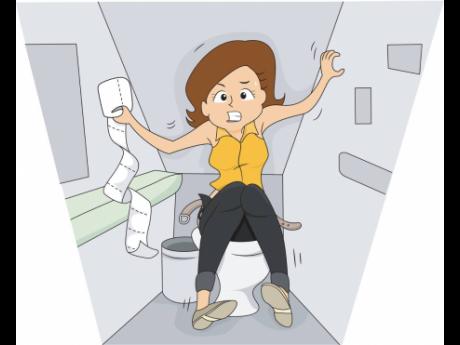Dear Doc | Why does callaloo make me constipated?
Q. I am a Jamaican living in England. I love callaloo, but mostly have to consume it from the tin.
However, after eating callaloo, I cannot go to the toilet for a week. My bowel gets very hard and dry, although I take in lots of water/liquid. After eating callaloo, I was expecting to have a free motion, but this is not so. Why does it makes me constipated?
Can you help?
A. This is quite peculiar indeed, because callaloo is a good source of fibre. It also has many other nutrients. However, the nutritive value varies, depending on the state in which it is eaten, whether raw or cooked. This may be a reason why you may be experiencing constipation, despite eating callaloo.
When callaloo is cooked, some of the fibre is converted to starch and provides energy. Canned callaloo is already cooked, so preparing it is simply a matter of warming it up with the desired seasonings. Though having less fibre than in its raw state, cooked callaloo still provides more nutrients than raw callaloo.
Cooked callaloo provides more iron than raw callaloo. However, to get the iron in the blood, callaloo should be consumed with fruits and vegetables high in vitamin C, such as tomatos, oranges or West Indian cherries. The vitamin C helps to pull the iron from the callaloo into the blood to prevent anaemia (weak blood). Iron is also known to contribute to constipation, so this could be another cause for your constipation, especially if you are taking other supplements or vitamins containing iron.
The canning process does not affect the fibre or nutritive value of the callaloo. Canned produce is harvested and canned at peak maturity. The delicate vitamins are lost during the process, but other nutrients are usually intact.
Health benefits
That being said, callaloo still has many health benefits which include:
- Helping to lower or maintain blood pressure and regulate heartbeat.
- The calcium makes strong bones and teeth and aids in the clotting of blood.
- The fibre in callaloo helps to form bulk in the faeces, making you feel less hungry after eating. It slows the absorption of glucose from the intestines, and traps excess fat in the intestines helping to lower LDL (bad) cholesterol. All these functions of fibre in callaloo help to reduce the risk of obesity, controls blood-sugar levels and lowers the risk of heart disease.
- Raw callaloo is an excellent source of vitamin C and should not be overcooked so that this delicate vitamin can be retained.
Here are some foods that are easily available to help with your constipation:
- Prunes
- Pears
- Kiwis
- Apples
- Figs
- Citrus fruits
- Artichoke
- Sweet potato
- Beans, peas and lentils
- Chia seeds and Flaxseeds
- Oats and Bran
Also continue to drink water and add exercise to help improve your bowel habit.
Morning erection vs erection for sex
Q. Is morning erection a full erection of length and thickness, compared to erection for sex?
A. This is an interesting question to which the answer is not so simple, as the answer varies depending on the individual.
A morning erection, medically called Nocturnal Penile Tumescence (NPT), is not a typical erection because it is not related to sexual thoughts, sexual dreams, or sexual stimulation. Instead, it is a normal function of the male reproductive system. It is simply a result of sleep cycles, combined with healthy nerves and blood flow in the body.
NPT happens when a person is in what is called the REM (rapid eye movement) phase of sleep.
We often wake up at the end of a REM sleep cycle, which explains why we observe NPT in the morning. In addition, testosterone levels tend to be more elevated in the morning.
Regular episodes of NPT are a sign that the nerves and blood supply to the penis are healthy, and that you are getting quality sleep.
As a person gets older, they can expect to experience morning erections less often. This change happens gradually, as hormone levels shift. But as it relates to the quality of the morning erection, as it pertains to length and thickness, that varies among individuals.
An erection caused by NPT may be physically different from one caused by sexual arousal. This is because these two types of erections are triggered by a different part of the brain.
I came across a survey asking men if their early-morning erections feel the same or are different from the erections they get when they are sexually aroused, and their responses were quite varied, and some of the responses contradict others.
Here are a few examples:
“Oddly enough, my morning erections are WAY harder and more persistent than my arousal erections” — 21 year-old.
“Real arousal will always result in a much harder erection than the ones I have when I wake.” — 25 year-old.
“Morning erections feels much more intense than regular arousal, and my penis is much more sensitive as well.” — 22 year-old.
“Arousal erections feel like total erections. They are much more firm than morning erections.” — 42 year-old.
So to answer your question, it depends on your own experiences, and what has been historically normal for you.
However, as it relates to sexual function, it is more the frequency of morning erections than the quality, that is more diagnostic, because a lack of regular NPT is indicative of erectile dysfunction.

